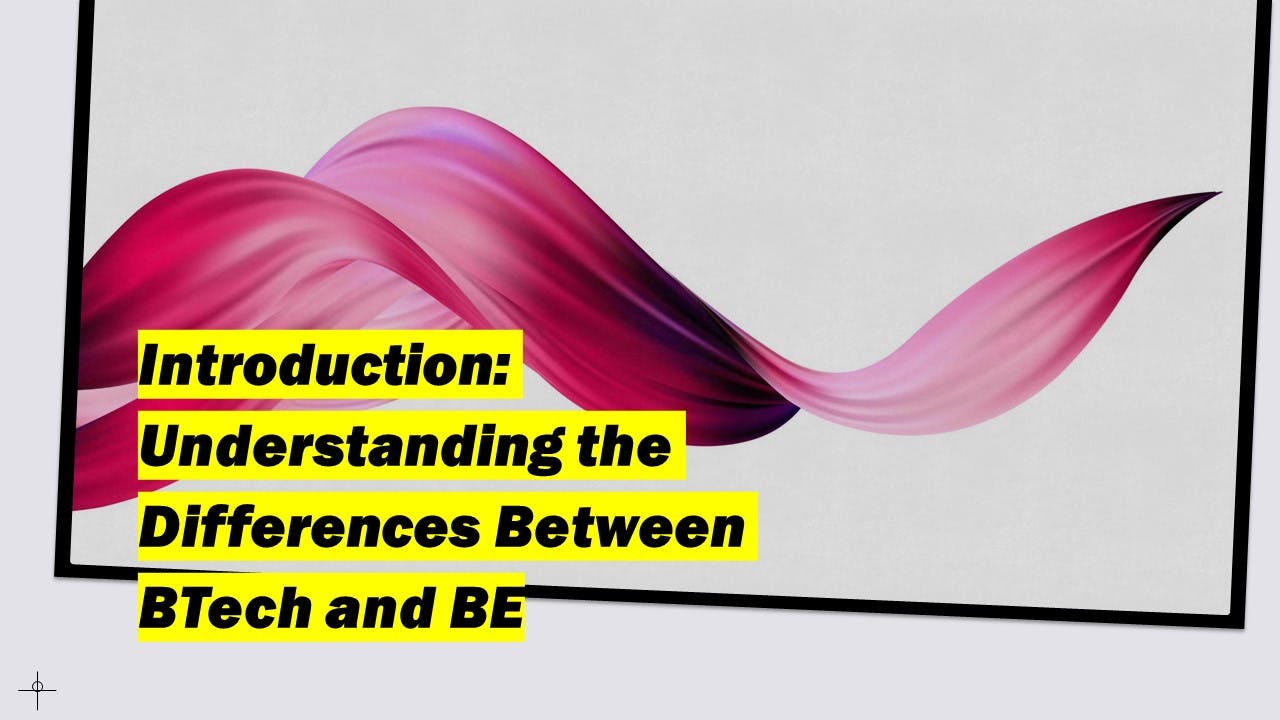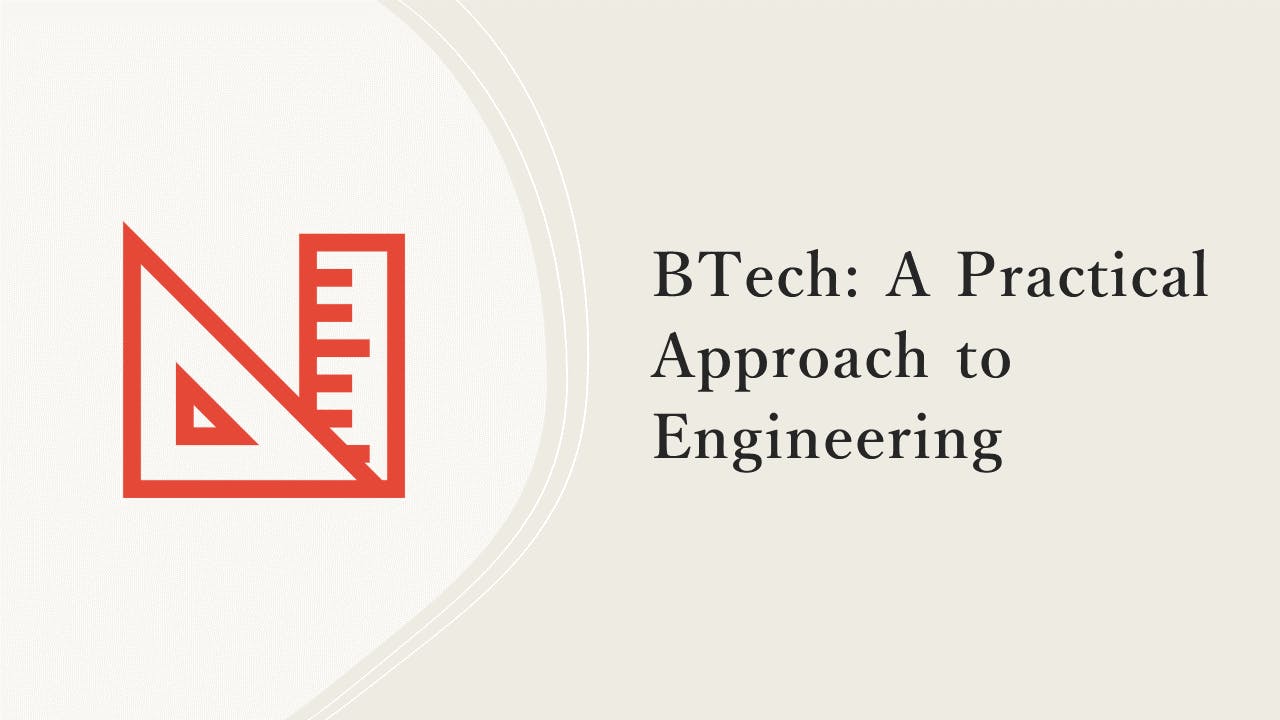BTech or BE: How to Choose the Right Engineering Degree for Your Career Goals
Exploring the Curriculum and Focus of BTech and BE Programs
Table of contents
- Introduction: Understanding the Differences Between BTech and BE
- BTech: A Practical Approach to Engineering
- BE: A Theoretical Focus on Engineering Principles
- Career Opportunities and Paths for BTech and BE Graduates
- Considerations for Choosing Between BTech and BE
- Conclusion: Making the Right Decision for Your Future
Deciding between a BTech (Bachelor of Technology) and a BE (Bachelor of Engineering) can be a challenging decision, as both degrees are designed to prepare individuals for careers in engineering. To help you determine which degree is right for you, it is important to understand the differences between BTech and BE programs, as well as the career opportunities available to graduates of each degree. In this article, we will explore the differences between BTech and BE programs and highlight the career opportunities available to graduates of each degree.
Introduction: Understanding the Differences Between BTech and BE

BTech (Bachelor of Technology) and BE (Bachelor of Engineering) are both undergraduate degrees in engineering, but they have some differences in terms of their curriculum and focus.
One key difference between BTech and BE programs is their emphasis. BTech programs tend to be more practical in nature, focusing on the application of engineering principles to real-world problems. These programs often include hands-on training and projects and may be more closely aligned with specific industries or sectors.
BE programs, on the other hand, may have a more theoretical focus, emphasizing the underlying principles of engineering and their applications. These programs may cover a wider range of engineering disciplines and may provide a more broad-based education in engineering.
Another difference between BTech and BE programs is the specific subjects and courses that are included in the curriculum. BTech programs may have a more specialized curriculum, with a focus on specific technologies or areas of engineering. BE programs may have a more diverse curriculum, covering a wider range of engineering disciplines and topics.
Both BTech and BE programs can lead to rewarding careers in engineering, but the specific focus and emphasis of each program may be better suited to different individuals and goals. To determine which degree is right for you, consider your interests and career goals, as well as the specific curriculum and focus of the programs you are considering. You may also want to speak with academic advisors, career counselors, or professionals in the engineering field to get a better sense of the opportunities available to graduates of each degree.
BTech: A Practical Approach to Engineering

BTech (Bachelor of Technology) programs offer a practical approach to engineering, focusing on the application of engineering principles to real-world problems. These programs often include hands-on training and projects and may be more closely aligned with specific industries or sectors. Here are a few potential case study points to consider when discussing the practical approach of BTech programs:
Industry partnerships and internships: BTech programs may have strong partnerships with local or regional industries, which can provide students with valuable hands-on experience and networking opportunities. Some programs may also include internships or co-op placements, which allow students to work in industry settings and apply their knowledge in a real-world setting.
Project-based learning: Many BTech programs incorporate project-based learning, in which students work on real-world problems or challenges as part of their coursework. This can provide students with valuable experience in problem-solving and project management, as well as an opportunity to apply their knowledge in a practical setting.
Practical coursework: BTech programs may include courses that are focused on practical skills and techniques, such as lab work, simulations, and hands-on projects. These courses can help students develop the skills and knowledge they need to succeed in their future careers.
Overall, the practical approach of BTech programs can be valuable for students who are interested in applying their knowledge and skills to real-world problems and challenges. These programs can be a good fit for students who are interested in specific industries or sectors, and who want to gain practical experience as part of their education
BE: A Theoretical Focus on Engineering Principles

BE (Bachelor of Engineering) programs have a theoretical focus on engineering principles, emphasizing the underlying principles of engineering and their applications. These programs may cover a wider range of engineering disciplines, and may provide a more broad-based education in engineering. Here are a few potential case study points to consider when discussing the theoretical focus of BE programs:
Diverse curriculum: BE programs typically have a diverse curriculum, covering a wide range of engineering disciplines and topics. This can provide students with a broad understanding of the field of engineering and help them to develop a range of skills and knowledge that are applicable across a variety of industries and sectors.
Theory-based coursework: BE programs may include courses that are more focused on theoretical concepts and principles, such as mathematics, physics, and engineering fundamentals. These courses can help students to understand the underlying principles that govern the field of engineering, and to develop a sturdy foundation of knowledge that they can build upon in their future careers.
Research opportunities: Many BE programs provide students with the opportunity to participate in research projects or to work on independent study projects. This can give students the chance to explore specific topics in greater depth, and to develop their own ideas and insights about engineering principles and practices.
Overall, the theoretical focus of BE programs can be valuable for students who are interested in a broad-based education in engineering, and who want to develop a solid foundation of knowledge and skills that are applicable across a variety of industries and sectors. These programs can be a good fit for students who are interested in pursuing careers in research or academia, or who want to develop a strong foundation of knowledge that they can build upon in their future careers.
Career Opportunities and Paths for BTech and BE Graduates

Both BTech (Bachelor of Technology) and BE (Bachelor of Engineering) degrees can lead to a wide range of career opportunities in engineering, but the specific opportunities available to graduates of each degree may vary depending on their specific program of study and focus. Here are a few potential case study points to consider when discussing career opportunities and paths for BTech and BE graduates:
Industry and sector: BTech programs often have a more practical focus, and may be more closely aligned with specific industries or sectors. As a result, BTech graduates may be more likely to find employment in these industries or sectors, and may have an advantage when it comes to finding internships or co-op placements during their studies. Some common industries and sectors for BTech graduates include manufacturing, construction, and energy.
Career paths: BTech graduates may be well-suited to careers that involve the practical application of engineering principles, such as design engineering, field engineering, or technical sales. These careers may require strong problem-solving and technical skills, as well as the ability to apply engineering principles to real-world problems.
Research and development (R&D): BE programs often have a more theoretical focus, and may provide a more broad-based education in engineering. As a result, BE graduates may be well-suited to careers in research and development, where they can use their strong foundation of knowledge and skills to explore new ideas and technologies. Some common career paths for BE graduates include research scientist, development engineer, and technology manager.
Management: Both BTech and BE graduates may be well-suited to careers in management, where they can use their technical skills and knowledge to lead teams and projects. Some common career paths for engineers in management include project manager, engineering manager, and operations manager.
Overall, both BTech and BE graduates have a wide range of career opportunities available to them, and the specific opportunities that are available will depend on their specific program of study, skills, and interests. Both degrees can lead to rewarding and challenging careers in engineering, and graduates of each degree should consider their goals and interests when deciding on a career path.
Considerations for Choosing Between BTech and BE

Deciding between a BTech (Bachelor of Technology) and a BE (Bachelor of Engineering) can be a challenging decision, as both degrees are designed to prepare individuals for careers in engineering. Here are a few potential case study points to consider when deciding between these two degrees:
Curriculum and focus: One key consideration when choosing between BTech and BE is the specific curriculum and focus of each program. BTech programs tend to be more practical in nature, focusing on the application of engineering principles to real-world problems. BE programs may have a more theoretical focus, emphasizing the underlying principles of engineering and their applications. Consider the specific subjects and courses that are included in each program, and think about which curriculum and focus aligns best with your interests and career goals.
Career opportunities: Another consideration when choosing between BTech and BE is the career opportunities available to graduates of each degree. BTech programs may be more closely aligned with specific industries or sectors, and graduates of these programs may be more likely to find employment in these areas. BE programs may provide a more broad-based education, and graduates of these programs may have more diverse career opportunities available to them. Consider the industries and sectors that you are interested in, and think about which degree program will provide you with the best foundation for your career goals.
Institution and location: The institution and location of the program you choose can also be important considerations. Some institutions may have a stronger reputation in certain areas of engineering, or may have stronger connections to specific industries or sectors. The location of the program may also be important, as certain regions may have a higher demand for engineers in certain industries or sectors. Consider the specific institutions and locations that are available to you, and think about which program will provide you with the best foundation for your career goals.
Ultimately, the choice between BTech and BE will depend on your interests and career goals, as well as the specific curriculum and focus of the programs you are considering. It is important to carefully weigh all of these factors, and to speak with academic advisors, career counselors, and professionals in the engineering field to get a better sense of the opportunities available to graduates of each degree.
Conclusion: Making the Right Decision for Your Future

Deciding between a BTech (Bachelor of Technology) and a BE (Bachelor of Engineering) can be a challenging decision, but it is an important one that will have a significant impact on your future career. To make the right decision for your future, it is important to carefully consider the specific curriculum and focus of each program, as well as the career opportunities that are available to graduates of each degree.
BTech programs tend to be more practical in nature, focusing on the application of engineering principles to real-world problems. These programs may be more closely aligned with specific industries or sectors, and may provide students with valuable hands-on experience and practical skills.
BE programs, on the other hand, may have a more theoretical focus, emphasizing the underlying principles of engineering and their applications. These programs may cover a wider range of engineering disciplines, and may provide students with a broad-based education in engineering.
Ultimately, the choice between BTech and BE will depend on your interests and career goals. Both degrees can lead to rewarding careers in engineering, but the specific focus and emphasis of each program may be better suited to different individuals and goals. Consider your interests and goals, as well as the specific curriculum and focus of the programs you are considering and make the decision that is right for your future.
